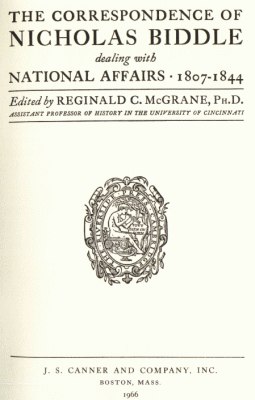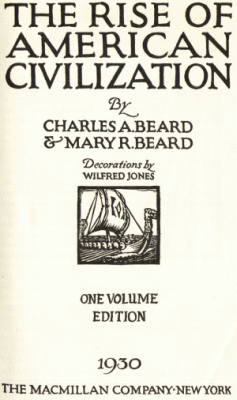 The Correspondence of Nicholas Biddle dealing with national affairs 1807 - 1844,
The Correspondence of Nicholas Biddle dealing with national affairs 1807 - 1844, The Rise of American Civilization,
The Rise of American Civilization,After the war on the Bank commenced, however, both he and his colleagues laid hold of the various weapons at hand. From that time forward, the allegation that members of Congress received retainers from the Bank certainly rested on a substantial basis. In any case its mightiest spokesman in the Senate, Daniel Webster, was on the payroll of the corporation, a fact made clear in distant days by the publication of Biddle's letters and papers. In those documents it is recorded that, two weeks after the opening of a congressional session in which a battle royal was to be fought over its charter, Webster wrote to Biddle, shrewdly conveying the information that he had declined to take a case against the Bank and adding with charming frankness: “I believe my retainer has not been renewed or refreshed as usual. If it be wished that my relation to the bank should be continued, it may be well to send me the usual retainers.”
Equally well established now is the charge that the Bank contracted its loans for the purpose of producing distress and breaking the back of the political opposition. Beyond all question, in the midst of the contest a term of financial stringency was deliberately inflicted on the country; Biddle, sure of his ground, declaring to the head of the Boston branch that "nothing but the evidence of suffering abroad will produce any effect in Congress." Webster himself, convinced that pressure on the populace would be useful, wrote to Biddle that "this discipline, it appears to me, must have very great effects on the general question of rechartering the Bank."
In fact, the private correspondence of the period now open to the student shows that the supporters and beneficiaries of the Bank had effected a strong union of forces for the purpose of controlling a large section of the press, dictating to politicians, frightening indifferent business men, and defying Jackson and his masses. "This worthy President," laughed Biddle, "thinks that because he has scalped Indians and imprisoned Judges, he is to have his way with the Bank. He is mistaken."